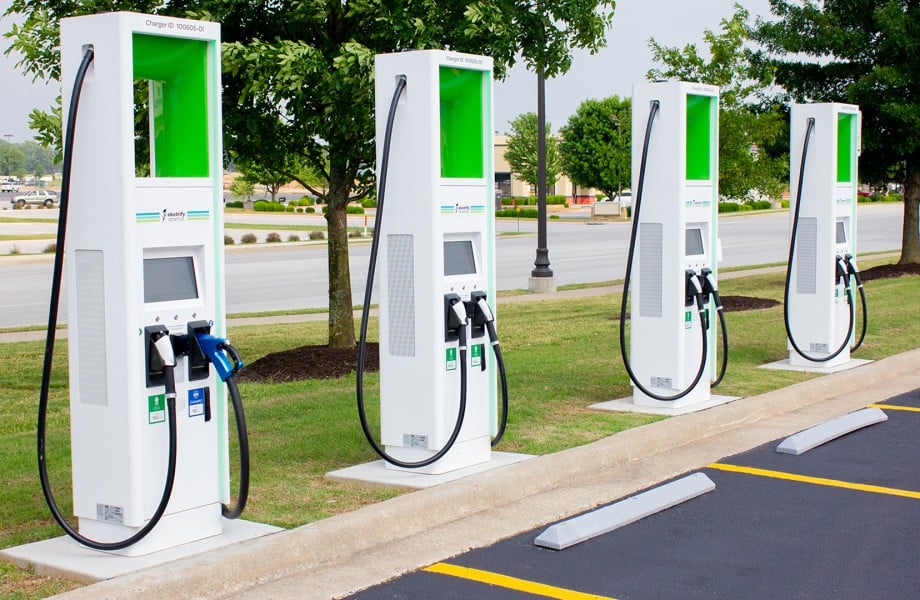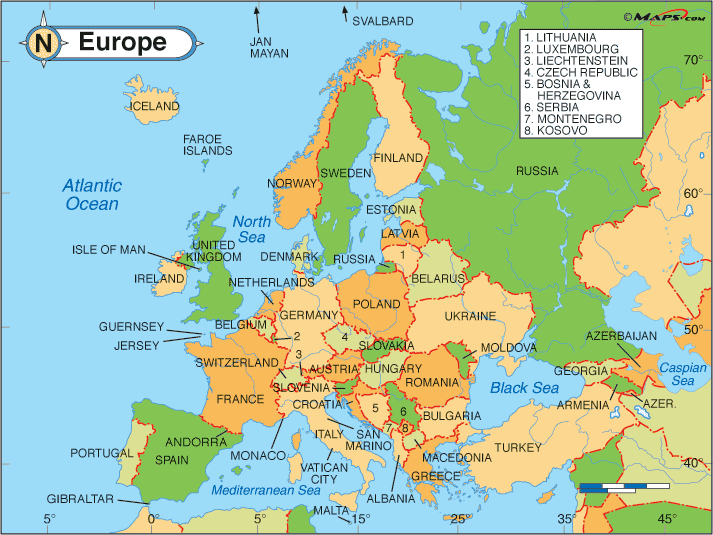Dude. Twitter as a reference and some more right-wing crap?Degrowth? What is this 'degrowth' you speak of? Is this something akin to allowing millions of third world economic migrants into the EU .. is that the 'degrowth' you speak of.
btw the Dutch being the Dutch are already on it. They're preparing (grooming) their people to start eating insects just like their UN masters instructed them.

"Worms For Dinner?" World Economic Forum Promotes Mealworms as New Protein Source in Europe's Bid to Reduce Meat Consumption | The Gateway Pundit | by Cristina Laila
The World Economic Forum promoted the EU’s new plan to use mealworms in food in their bid to reduce meat consumption.www.thegatewaypundit.com
You are using an out of date browser. It may not display this or other websites correctly.
You should upgrade or use an alternative browser.
You should upgrade or use an alternative browser.
European Union aiming to ban new combustion engine cars starting 2035
- Thread starter Daniel Sims
- Start date
Yup. The extreme right's answer to everything.
I'll put my bets on the people embracing the future instead of living in the past. There are new battery technologies coming to market and there is extensive research into better batteries so much so that its not easy to keep up on it. Many of those technologies DO NOT involve LITHIUM at all.
Those embracing the future will find a way. In the meantime, everyone still living in the past is welcome to continue to do so.
Those embracing the future will find a way. In the meantime, everyone still living in the past is welcome to continue to do so.
AlaskaGuy
Posts: 868 +848
Yup. The extreme right's answer to everything.

UK climate activists block fire engine, ambulance from responding to emergencies
More than 30 climate activists blocked a major road in London during rush hour Tuesday, forcing both a fire engine and ambulance to take different routes to their destination.
AlaskaGuy
Posts: 868 +848
So you're saying those articles in the twitter links are all lies eh.Dude. Twitter as a reference and some more right-wing crap?
Some of the comments seem to think that the power grid won't be able to handle it by then. Here in the Netherlands they are already making plans to massively increase the capacity of the power grid to not only be able to handle the demand, but also the increased load from windmills and solar panels.
And we in the US are also.Some of the comments seem to think that the power grid won't be able to handle it by then. Here in the Netherlands they are already making plans to massively increase the capacity of the power grid to not only be able to handle the demand, but also the increased load from windmills and solar panels.
Plus, I live in dipshit central, the American deep south, but even here in Arkansas we are right now implementing a charging system.

Arkansas gets approval for electric vehicle charging plan
Arkansas drivers could see more charging stations start popping up along major travel corridors.
In my opinion, for the near future, we should aim for the point where a gasoline vehicle is about as common as a diesel is right now.
Last edited:
AlaskaGuy
Posts: 868 +848
According to the article Arkansas 'could' get up to 50 new charging stations (using taxpayer dollars of course) giving them a grand total of 54 EV charging stations for the entire state. lolzAnd we in the US are also.
I live in dipshit central, the American deep south, but even here in Arkansas we are right now implementing a charging system.

Arkansas gets approval for electric vehicle charging plan
Arkansas drivers could see more charging stations start popping up along major travel corridors.www.fayettevilleflyer.com
In my opinion, for the near future, we should aim for the point where a gasoline vehicle is about as common as a diesel is right now.

Congrats. You just said what I linked to. Give yourself a cookie.According to the article Arkansas 'could' get up to 50 new charging stations (using taxpayer dollars of course) giving them a grand total of 54 EV charging stations for the entire state. lolz

"The state currently has 172 publicly available EV charging stations"According to the article Arkansas 'could' get up to 50 new charging stations giving them a grand total of 54 EV charging stations for the entire state. lolz
Maybe math has changed, but 172 plus 50 is 222.
And lucky for you, I love to repeat myself. Everything the government does is paid for with taxpayer dollars.
OOps!
I almost forgot, but since Im all grown up now..... LOLZ!
And thanks for the Arkansas map. I have one too!
Last edited:
AlaskaGuy
Posts: 868 +848
The state currently has 172 publicly available EV charging stations, but only five NEVI-compliant stations. In order to be compliant with NEVI standards, a station must have four charging ports that are each capable of 150kW of continuous power and located within one mile of an interstate interchange.Congrats. You just said what I linked to. Give yourself a cookie.
"The state currently has 172 publicly available EV charging stations"
Maybe math has changed, but 172 plus 50 is 222.
And lucky for you, I love to repeat myself. Everything the government does is paid for with taxpayer dollars.
OOps!
I almost forgot, but since Im all grown up now..... LOLZ!
And thanks for the Arkansas map. I have one too!
Are you absolutely sure you want to continue quoting my link? Really? Ok!The state currently has 172 publicly available EV charging stations, but only five NEVI-compliant stations. In order to be compliant with NEVI standards, a station must have four charging ports that are each capable of 150kW of continuous power and located within one mile of an interstate interchange.
Because that is exactly why they are being installed. Interstate access.
Are you....... Never mind.

I have been using a level 2 charger when I take my Focus EV to the Ozarks. For over a year now.
3ogdy
Posts: 153 +180
Cars are getting rather expensive to own anyway. So far it seems it's considerably cheaper to own and maintain an electric car.
Let’s take the following example:
Location: Western Europe
Income: €1200 /mo
Job: 65KM away from home
Driving distance: min 130KM/day
Car: 1.8L Toyota Avensis T25
Fuel economy: 7L/100 km or 33MPG HWY (it's mostly hwy driving)
Gas price: 1.6€ / L - 1.75€ / L
30% of the monthly pay is spent on the car.
This includes:
Gas €395 / mo
Maintenance : approx. €170. Includes:
Oil change: €80 (filters & labor incl.)
Brake pads: €50 (approx.). Labor incl.
Other possible issues.
Yearly Contamination Tax for a car that generates 171gr of CO / km : €70
Yearly insurance (most basic one): €350
Yearly inspection: €35
Yearly Road Tax: €150
Yearly parking expenses (if I go somewhere and have to pay for it): approx. €180
Yearly Car Wash: €40
TOTAL MONTHLY EXPENSES: €477
€1200 - €477 = €723
Monthly expenses on an unrestricted travel card (bus, train, metro, as often as you wish) : €150 / mo
I'm not so sure owning a car in these circumstances is worth the hassle.
Let’s take the following example:
Location: Western Europe
Income: €1200 /mo
Job: 65KM away from home
Driving distance: min 130KM/day
Car: 1.8L Toyota Avensis T25
Fuel economy: 7L/100 km or 33MPG HWY (it's mostly hwy driving)
Gas price: 1.6€ / L - 1.75€ / L
30% of the monthly pay is spent on the car.
This includes:
Gas €395 / mo
Maintenance : approx. €170. Includes:
Oil change: €80 (filters & labor incl.)
Brake pads: €50 (approx.). Labor incl.
Other possible issues.
Yearly Contamination Tax for a car that generates 171gr of CO / km : €70
Yearly insurance (most basic one): €350
Yearly inspection: €35
Yearly Road Tax: €150
Yearly parking expenses (if I go somewhere and have to pay for it): approx. €180
Yearly Car Wash: €40
TOTAL MONTHLY EXPENSES: €477
€1200 - €477 = €723
Monthly expenses on an unrestricted travel card (bus, train, metro, as often as you wish) : €150 / mo
I'm not so sure owning a car in these circumstances is worth the hassle.
Last edited:
TempleOrion
Posts: 175 +142
I'm sure it's going to become more of a rental service paradigm in future. Book your vehicle of choice depending on circumstances, it delivers itself to your door, you pay per Km (rates changing based on traffic and time of day) etc...Cars are getting rather expensive to own anyway. So far it seems it's considerably cheaper to own and maintain an electric car.
Which country are you using as an example? €1200 is far below minimum wage in the Netherlands. And with the labour shortage, wages are going up. Also you can get €0,19 cent per km reimbursed by your employer, which in your scenario will be €494,- per month. Some have even increased that to €0,40 cents per km, which would completely cover the costs.Cars are getting rather expensive to own anyway. So far it seems it's considerably cheaper to own and maintain an electric car.
Let’s take the following example:
Location: Western Europe
Income: €1200 /mo
Job: 65KM away from home
Driving distance: min 130KM/day
Car: 1.8L Toyota Avensis T25
Fuel economy: 7L/100 km or 33MPG HWY (it's mostly hwy driving)
Gas price: 1.6€ / L - 1.75€ / L
30% of the monthly pay is spent on the car.
This includes:
Gas €395 / mo
Maintenance : approx. €170. Includes:
Oil change: €80 (filters & labor incl.)
Brake pads: €50 (approx.). Labor incl.
Other possible issues.
Yearly Contamination Tax for a car that generates 171gr of CO / km : €70
Yearly insurance (most basic one): €350
Yearly inspection: €35
Yearly Road Tax: €150
Yearly parking expenses (if I go somewhere and have to pay for it): approx. €180
Yearly Car Wash: €40
TOTAL MONTHLY EXPENSES: €477
€1200 - €477 = €723
Monthly expenses on an unrestricted travel card (bus, train, metro, as often as you wish) : €150 / mo
I'm not so sure owning a car in these circumstances is worth the hassle.
Not to mention that company cars are a normal thing here, bringing monthly costs down even further even when using it for personal stuff. Even so, it is still expensive to drive a car, gas price is close to 2 euro a litre and monthly taxes are higher. But it isn't anything like the scenario you wrote. Also if you use public transport your employer can completely cover all costs (which mine does). So the commute is essentially free for me.
3ogdy
Posts: 153 +180
I guess Spain is much worse off than the Netherlands.Which country are you using as an example? €1200 is far below minimum wage in the Netherlands. And with the labour shortage, wages are going up. Also you can get €0,19 cent per km reimbursed by your employer, which in your scenario will be €494,- per month. Some have even increased that to €0,40 cents per km, which would completely cover the costs.
Not to mention that company cars are a normal thing here, bringing monthly costs down even further even when using it for personal stuff. Even so, it is still expensive to drive a car, gas price is close to 2 euro a litre and monthly taxes are higher. But it isn't anything like the scenario you wrote. Also if you use public transport your employer can completely cover all costs (which mine does). So the commute is essentially free for me.
Minimum wage in Spain is €965.There are companies out here covering transport expenses the way you mentioned, either by paying for it directly or by allowing you to use a company car. Most of them don't, though.
TempleOrion
Posts: 175 +142
BTW The UK date is 2030 and Norway's is... 2025. 80% of the latter's new car purchases are already full electric so it's no biggie for them.
Spain is also southern Europe, not western Europe.I guess Spain is much worse off than the Netherlands.
Minimum wage in Spain is €965.There are companies out here covering transport expenses the way you mentioned, either by paying for it directly or by allowing you to use a company car. Most of them don't, though.
AlaskaGuy
Posts: 868 +848
Yet it's further west than most of Europe.Spain is also southern Europe, not western Europe.

It is also further south than most of Europe and is generally considered to be southern Europe.Yet it's further west than most of Europe.

Last edited:
Similar threads
- Replies
- 8
- Views
- 296
- Locked
- Replies
- 0
- Views
- 5K
Latest posts
-
Google's AI Overviews hit by EU antitrust complaint from independent publishers
- unoficialoficial replied
-
Ploopy Knob is an open-source control dial for Windows and Linux PCs
- Theinsanegamer replied
-
Nvidia closes in on $4 trillion valuation, surpasses Apple's record
- Megalomaniac replied
-
TechSpot is dedicated to computer enthusiasts and power users.
Ask a question and give support.
Join the community here, it only takes a minute.